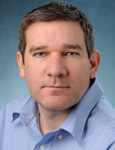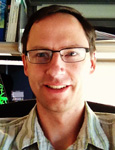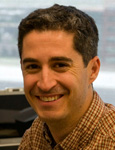 |
A Message from the President
June 2012
Back to email
CU researchers honored as 2012 Boettcher Investigators
Third class joins Colorado's Webb-Waring Biomedical Research Program
The Boettcher Foundation recently announced its 2012 class of Boettcher Investigators in the Webb-Waring Biomedical Research Program. We are proud to note that all three of this year's recipients are University of Colorado researchers. In its third year, the program honors the tradition of Colorado's Webb and Waring families by investing in science that has the possibility of making significant contributions to human health.
This year's honorees are:
 |
Harald Junge, Ph.D., University of Colorado Boulder, Retinal Vascular Development and Disease. Junge's lab studies retinal blood vessels using mice as a model system. By focusing on understanding molecular processes that instruct the development and function of the retinal vasculature, Junge aims to further understand the role of these molecular processes in causing blinding diseases. For example, the neovascular form of age-related macular degeneration and diabetic retinopathy are leading causes of blindness. Both diseases critically involve pathological changes in the retinal vasculature and highlight the need to understand the biology of this important structure. |
 |
Matthew Kennedy, Ph.D., University of Colorado Anschutz Medical Campus, Molecular Mechanisms of Alzheimer's Pathology. The Kennedy lab studies how connections between neurons in the brain, known as synapses, are changed through learning, a process known as synaptic plasticity. This process is required for normal cognition and goes awry in diseases and disorders including autism, addiction and Alzheimer's. Clarifying the mechanisms of plasticity will be key to understanding how memory is ravaged by disease and to begin developing effective therapies to prevent the cognitive decline associated with many neurological disorders. Most recently, the Kennedy lab is studying how one of the potent neurotoxic agents responsible for Alzheimer's triggers the loss of synapses and leads to neuronal cell death. |
 |
Chad G. Pearson, Ph.D., University of Colorado Anschutz Medical Campus, Organization of the Microtubule Cytoskeleton for Cell Division and Signaling. Pearson's lab studies how cellular polymers called microtubules are organized to divide cells, to support intercellular communication and to move mucus. Disruption of these events contributes to cancer, developmental and neurological anomalies, and respiratory illness. Pearson's research is dedicated to understanding how genetic perturbations lead to these devastating illnesses. |
The Webb-Waring Biomedical Research program enables early-career investigators engaged in biomedical sciences to advance their research. Congratulations to Junge, Kennedy and Pearson. We look forward to following their great achievements in biomedical sciences.
Back to email
Make a difference. Give today!

|
 |
Office of the President, University of Colorado
1800 Grant Street, Suite 800, Denver, CO 80203
General Phone: (303) 860-5600 | Fax: (303) 860-5610 |
officeofthepresident@cu.edu
www.cu.edu |
|





